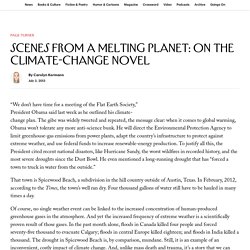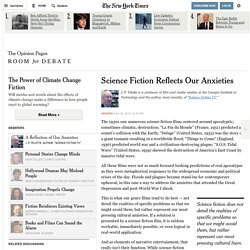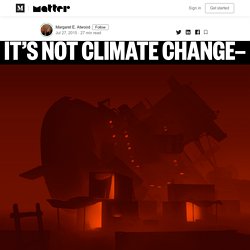

Save the world! by guiraudie.monteil on Genially. ERROR,TRYAGAIN,Back,Photos,All the photos used were taken randomly from different urbex websites.

I hope the photographers will forgive me but I am not making money out of this serious game.,Thanks,First I would like to thank all my students. I made this game for you and I hope you enjoyed it. Then my partner and my cats who went crazy because I spent too much time making it.Finally the FB groups "Le Coin des Profs d'Anglais" and "Escape'n Games" who are always supportive and helped me take this first step into gamification. The NewYorker Acrticle - Scenes from a Melting Planet. “We don’t have time for a meeting of the Flat Earth Society,” President Obama said last week as he outlined his climate-change plan.

The gibe was widely tweeted and repeated, the message clear: when it comes to global warming, Obama won’t tolerate any more anti-science bunk. He will direct the Environmental Protection Agency to limit greenhouse-gas emissions from power plants, adapt the country’s infrastructure to protect against extreme weather, and use federal funds to increase renewable-energy production. To justify all this, the President cited recent national disasters, like Hurricane Sandy, the worst wildfires in recorded history, and the most severe droughts since the Dust Bowl. He even mentioned a long-running drought that has “forced a town to truck in water from the outside.” That town is Spicewood Beach, a subdivision in the hill country outside of Austin, Texas. The Day After Tomorrow: Why Cli-Fi Matters. Site de Ressouces -The Cli-Fi Report. Debate on Cli-Fi - NYTimes.com. J.

P. Telotte is a professor of film and media studies at the Georgia Institute of Technology and the author, most recently, of "Science Fiction TV. " The 1930s saw numerous science fiction films centered around apocalyptic, sometimes climatic, destruction: “La Fin du Monde” (France, 1931) predicted a comet’s collision with the Earth; “Deluge” (United States, 1933) was the story of a giant tsunami resulting in a worldwide flood; “Things to Come” (England, 1936) predicted world war and a civilization-destroying plague; “S.O.S. Tidal Wave” (United States, 1939) showed the destruction of America’s East Coast by massive tidal wave. All these films were not as much forward-looking predictions of real apocalypse as they were metaphorical responses to the widespread economic and political crises of the day. Science fiction does not detail the realities of specific problems so that we might avoid them, but rather represent our most pressing cultural fears. J. Margaret Atwood TEXT : It’s Not Climate Change — It’s Everything Change.
Not that the lobster can do anything about it, once in the pot.

But we might. We’re supposed to be smarter than lobsters. We’ve committed some very stupid acts over the course of our history, but our stupidity isn’t inevitable. Here are three smart things we’ve managed to do: First, despite all those fallout shelters built in suburban backyards during the Cold War, we haven’t yet blown ourselves up with nuclear bombs. “For everything to stay the same, everything has to change,” says a character in Giuseppe di Lampedusa’s 1963 novel, The Leopard. There are many smart people applying themselves to these problems, and many new technologies emerging.
Meanwhile, courage: homo sapiens sapiens sometimes deserves his double plus for intelligence. An earlier version of this article appeared in the Norwegian magazine Samtiden. Appendix: Companies that take CO2 out of the air. Spider the Artist - Online Short Story. Zombie no go go, unless you tell am to go Zombie!

Zombie! Zombie no go stop, unless you tell am to stop Zombie no go turn, unless you tell am to turn Zombie! Zombie no go think, unless you tell am to think —from Zombie by Fela Kuti, Nigerian musician and self-proclaimed voice of the voiceless My husband used to beat me. Going out there was the best way to put space between me and him without sending him into further rage. Pop Culture And Climate Change (KPBS Midday Edition Segments) Max Brooks' "World War Z" book and Steven Soderbergh's film "Contagion" accurately predicted many aspects of today's current pandemic and even suggested ways to better prepare for such global catastrophes.

But since they were works of fiction most people dismissed them as mere entertainment. Here's how pop culture has been considering the notion of climate change for more than a century. Speaker 1: 00:00 The book, world war Z and the film contagion accurately predicted many aspects of today's current pandemic and even suggested ways to better prepare for such global catastrophes, but since they were works of fiction, most people dismiss them as mere entertainment.
Kbps arts reporter Beth Aqua commando says, pop culture has been considering the notion of climate change for more than a century and has this look at some of their offerings from the earliest civilizations.